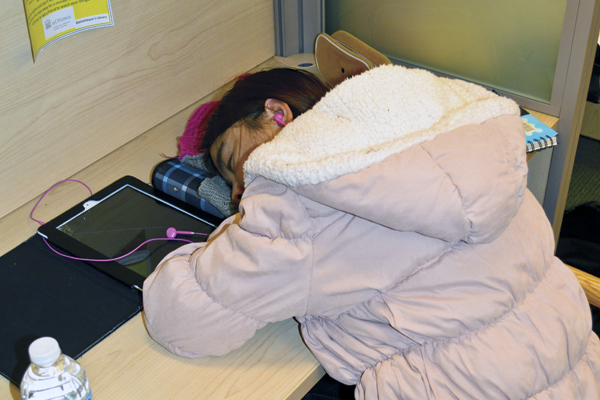A guide to staying well-rested and well-read as you work your way through finals
Photos by Jennifer Vo
The recommended daily sleep for a student is six to eight hours. But who has time for that when there are midterms to study for, papers to write, and episodes of Duck Dynasty to catch up on? If you find yourself falling behind in the number of ZZZs you catch each night, it’s time to take up the art of napping.
You won’t always have time to sneak off partway through the day and take a quick power nap in the privacy of your own home. You also don’t simply close your eyes in the middle of history class and doze off. You need to be able to stealthily sleep in class and not get caught. It takes technique, it takes talent, and it takes commitment.
After years of observing students and learning the sacred art of napping and its teachings, I have learned a few tricks to dozing off in class. After all, you can’t blame a student for feeling tired when the lights are dimmed, you’re sitting in the comfy UCU auditorium chairs, and you just had the most satisfying lunch. These all create the perfect napping atmosphere.
Try placing your right elbow on the table, resting your head in the palm of your hand, and facing your head downwards so you’re looking towards the desk. For added flair, have a book open to any page that looks relatively important and try to cover your eyes with your bangs. That should give you a quick 15 minutes to reenergize.
If you do have the luxury of going home and taking a nap, try to find a comfortable place where you can lie down.
“I usually nap on my couch instead of my bed because I find it harder to get up afterwards,” says Patricia-Joy Crosby, a first-year public and international affairs student.
While napping is seen as an activity for the lazy and weak, it actually has many health benefits. Studies have proven that it’s better to sleep in intervals because it enhances concentration, improves motor skills, and increases mental alertness.
To enhance your naptime, don’t have coffee, sugar, or a big meal before you sleep and make sure the room is quiet. Try to concentrate on your breathing and relax your muscles. Set your alarm to wake you up in 20 to 30 minutes to prevent your body from going into a deep sleep.
As final exams approach, plan a few nap breaks in between endless hours of panicking about not being ready and being bored to death by PowerPoint. It will help with your concentration and allow you to be more focused on what you’re studying.
“I usually study for a couple of hours and take a quick nap in between so I don’t feel as tired and I can concentrate more,” says Ashley Kasaboski, a second-year nursing student.
If you ever do need to take a power nap to reenergize and you can’t go home or find a good place to sleep, I’ve heard the Montpetit couches are quite comfortable.





